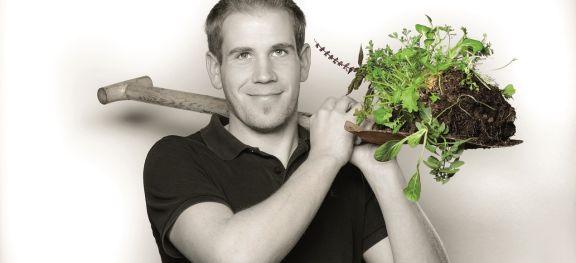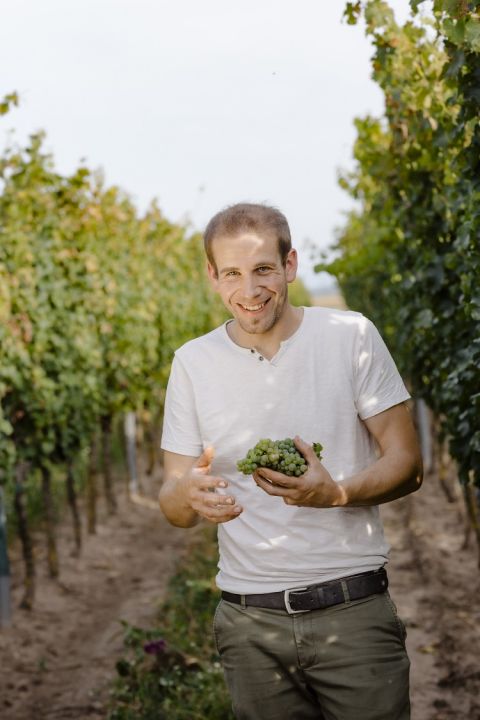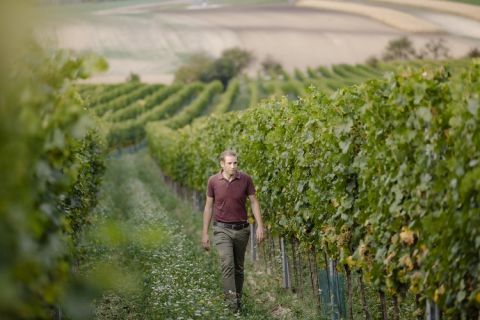Pratsch, Rosé 2020 Niederösterreich

Anybody would think that the second week of August 2021 had been designated Think Pink Week on JancisRobinson.com…
From €7.50, $11.29, 99 Danish kroner, £12.50, 15.90 Swiss francs
I'd not come across Stefan Pratsch before, but when this free-run-juice Zweigelt rosé landed on my desk, it piqued my interest in more ways than one. For some reason I'd expected something simple. Maybe it was the clear-glass bottle, maybe the visible spritz. Maybe the smell of rhubarb candy on the nose. But it was remarkably complex. It had surprising substance and depth for a low-temperature-/stainless-steel-fermented pink wine. There was nothing candied about how it tasted. The fruit had crunch, confidence, distinct shape. There was the caraway-scented herbaceousness of perilla leaf, a touch of violet and the tartness of white strawberries. I could taste red-apple skin and the perfumed sweetness of Pink Lady apples. And that distinct but very delicate fizz gave it a sherbet-dab buzz that was inexplicably irresistible.
I looked Pratsch up. He's very young. He was even younger when, at the age of 15, he took over the winemaking at the family's estate in Niederösterreich. His parents left him to get on with it while they focused on the viticulture for their 20 ha (50 acres) of vineyards, which have been 100% organic for over 30 years – long before sustainability was widely understood to be important or even sensible. As a family they place enormous importance on biodiversity and soil that is full of life. As well as not using herbicides or pesticides, they plant cover crops, trellis high to minimise fungal issues and use natural fertilisers.
All the wines are made by spontaneous fermentation with no other additions bar the very minimum of sulphites. I see he also makes a couple of skin-contact wines, one from Gewurz and one from Grüner, which would be very interesting to try! That this entry-level rosé is this good bodes well for his other wines. The fruitiness of the Zweigelt is braced by 5% Cabernet Sauvignon and lifted by 5% Pinot Noir. It ended up on the table at the same time I was doing this week's food-pairing article, and was the clear runner-up to Black Chalk's Dancer rosé. In fact, it turned out to be an excellent all-round food wine. The next night we made our own sesame-prawn toast and it went just as well with that as it did with harissa lamb chops and a lemon-chill-basil grilled courgette salad. I wasn't surprised to see that it has 4.8 g/l of residual sugar – what was I saying about the little magic that happens when rosé with smartly judged residual sugar and bold acidity (here, around 6 g/l) meets food? And it's just 11.5%. Perfect for a light supper or weekend garden lunch.
I've deliberately left the vintage out of the Wine-Searcher link because many of the merchants selling the wine have not stated a vintage on their websites, although it's very likely to be the latest vintage, 2020. You're likely to be as happy with the 2019, and possibly even the 2018, because this is a rosé with at least a couple of years in it. The wine can be bought in Austria, Germany, Switzerland, Denmark, USA (CO, CA, MA, RI, MT, MN, FL, GA) and from the very exciting small independent, Wanderlust Wine, in the UK.
We take pink wine pretty seriously at JancisRobinson.com. It's not just for summer barbecues and beach picnics. Have a look here for more on rosé, including Monday's most recent rosé round-up.
The photos for the article have all been provided courtesy of Pratsch.
Become a member to view this article and thousands more!
- 15,412 featured articles
- 275,117 wine reviews
- Maps from The World Atlas of Wine, 8th edition (RRP £50)
- The Oxford Companion to Wine, 5th edition (RRP £50)
- Members’ forum
- 15,412 featured articles
- 275,117 wine reviews
- Maps from The World Atlas of Wine, 8th edition (RRP £50)
- The Oxford Companion to Wine, 5th edition (RRP £50)
- Members’ forum
- 48-hour preview of all scheduled articles
- Commercial use of our wine reviews



